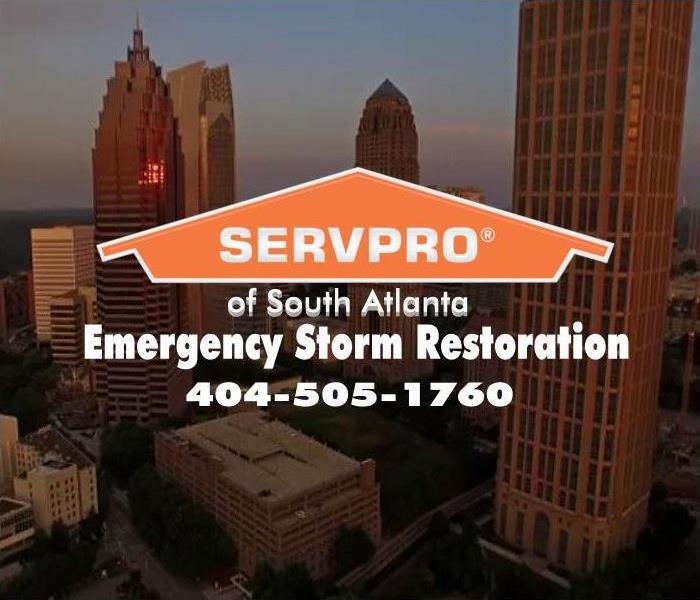Disaster History in Atlanta, GA
3/26/2020 (Permalink)
 Have storm damage? Need flood water extracted? Call SERVPRO of South Atlanta today! We can make water damage "Like it never even happened."
Have storm damage? Need flood water extracted? Call SERVPRO of South Atlanta today! We can make water damage "Like it never even happened."
Atlanta faces many types of disasters on a fairly regular basis. These disasters include tornadoes, severe storms, floods and winter storms. There are also man made and disease threats that Atlantans and all Americans face. Most of the time these happen quickly and with little to no warning. It is important that every Altantan knows what to do in case of emergency.
Tornadoes
Over the last 50 years, more than 1,450 tornadoes have been reported in Georgia. Even though these storms can occur at any time of the year, March, April and May are traditionally the most active months.
- In March 2008, Metro Atlanta was hit by a tornado damaging the CNN Center, the Georgia Dome, Georgia World Congress Center, and multiple other downtown buildings. This tornado caused a half a billion dollars in damage to the city. There were also a confirmed 45 tornadoes over a 24 hour period from eastern Alabama to the Carolina coast but most of the concentration was over Metro Atlanta.
Severe Storms & Flooding
Severe storms are the most common types of natural disasters that affect the Metro Atlanta area. They have the potential to cause extreme damage, potentially resulting in flooding, downed trees, and widespread power outages.
- In 1998, severe storms hit the entire state, bringing flooding to 119 counties in Georgia, Atlanta included.
- In September 2009, extensive, continuous rain affected several counties in Georgia, concentrating in the Metro Atlanta area. This rain resulted in 500-year floods. The flood claimed at least 10 deaths and caused $500 million in damages. Twenty-three counties received Federal Disaster Declarations and over 20,000 homes, business and other buildings were affected.
Winter Storms
Mostly affecting North Georgia, these winter storms are responsible for blocked roads, downed power lines and extreme cold.
- In 1993, the “Storm of the Century” was a blizzard hit the Atlanta area. It dropped more than four inches of snow and shut down the entire metro area for almost 3 days.
- A blizzard nicknamed “Snowmageddon” hit Atlanta in 2014, paralyzing most of North Georgia. It left thousands of Georgians stranded in their vehicles for more than 20 hours. According to the Georgia State Patrol, more than 1500 auto accidents and 180 injuries were caused by the storm.
- Just 2 weeks after “Snowmageddon” another more powerful storm ravaged north and central Georgia, bringing heavy snow and record amounts of ice and left more than 200,000 residents of Georgia without power.
Terrorist Attacks on Atlanta
Although Atlanta has not experienced a large scale terrorist attack, it is still at risk. These attacks typically occur without warning.
- A bombing occurred at Centennial Olympic Park during the 1996 Olympics hosted in Atlanta. It resulted in 4 deaths and 111 injuries. In the year following, the same man bombed an Atlanta area health clinic and a night club. In 2005, the bomber, Eric Rudolph, eventually pled guilty and was sentenced to life in prison which he is currently serving.
- In June 2019, a Georgia Tech student was providing material support for a terrorist organization and was convicted of his crime and is now serving 13 years in federal prison.
Pandemic Flu
When a pandemic outbreak occurs there is usually little to no time to fully prepare. These outbreaks spread rapidly and oftentimes without even realizing a person is spreading the virus.
- The World Health Organization (WHO) declared H1N1 influenza as a pandemic in 2009. Almost 50 people died and more than 800 were hospitalized in Georgia as a result of this virus.
- In 2020, COVID-19 a novel strain of the Corona Virus was declared a pandemic. This rapidly spreading virus infected an unknown number of Atlantans as well as people all over the world.
Throughout these different types of powerful storms, SERVPRO of South Atlanta has been there to assist the residents of Atlanta and North Georgia. With our extensive knowledge and IICRC certifications we remain the #1 choice for disaster relief in Georgia as well as nationwide. We continue to be there to help you get back to your pre-disaster state, “Like it never even happened.”






 24/7 Emergency Service
24/7 Emergency Service